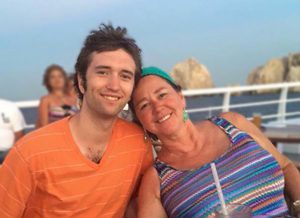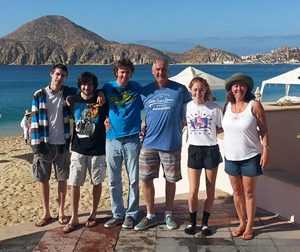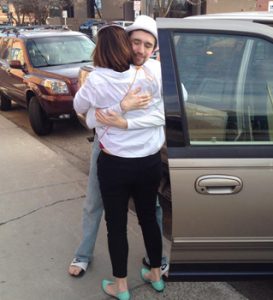
Laura Crooks, director of Rehabilitation Medicine, shares how losing her son, Chad, sent Laura and her husband on a mission to eliminate the stigma around mental illness.
My son had mental illness.
It seems so strange to write those words. Instead, I want to write that he was creative and loving and gentle. I want people to know him as a big brother and a son who lived in a large and loving family. I want him to be famous for his dream of inventing bold new means of space travel. But today, the part of Chad’s life I am compelled to share is that he had mental illness.
Chad was diagnosed with schizophrenia in April 2015. One evening, not long after telling his father and me that he had been hearing voices, he became suicidal.
I remember that night like it was yesterday. I remember taking him in the car, his dad holding him in a blanket at 21 years old, just so he wouldn’t jump out of the car as we made the trip up Interstate 5 to the University of Washington Emergency Department.
I remember coaching Chad on what to say once we got there: to tell them he wouldn’t make it through the night if they let him go. I remember how hard it was as a mom to tell my son to say these things. But I also know the truth about limited resources for mental health, and that this was the only way for him to truly get help and to keep him safe.

That night, he asked us not to tell his brothers and sister where he was. He asked that we simply tell them he was staying at a friend’s house. He thought they would think less of him for his illness, and that weighed heavily on Chad. The stigma attached to his illness was so strong and damaging.
You see, mental illness is not mental weakness, although we often look at it that way. It is a disease much like heart disease, diabetes or even cancer, but we often act as if that is not true. We might think that if the person was stronger, had a more supportive family or if they could just get their act together, they wouldn’t have this problem.
We attribute mental illness to people who have violent outbursts or who mutter to themselves. It is true that mental illness does affect some of those people. But it also affects those who are kind and gentle, funny and a little quirky. It affects those who are smart, even brilliant, and yet suffer in silence because they fear the stigma of their disease. The truth is, mental illness affects so many.
Over the course of nine months, Chad’s schizophrenia impacted him greatly at times. He held a job, but needed to modify his schedule. He was a student at Montana State University, but was forced to break from school, hoping to one day return. He had dark times when he would become frustrated and depressed at what this disease was doing to him.
Once, on vacation, we locked our hotel door so he wouldn’t leave and harm himself. Another time I remember holding and reassuring him after a suicide attempt when we were out of town away from resources.

Chad received medical care that proved laborious and was left in his hands to manage, which he became unable to do consistently. As his parents, we were left to be his care coordinators, helping him manage appointments and medications. With Chad being over age 18, when healthcare becomes much less parent-collaborative, this was not an easy task.
In doing his own research, Chad saw that the treatment for schizophrenia, like many mental illnesses, was one that would likely never cure his disease. He felt it slowly taking over who he was; the voices impacted his thinking, making him unable to sleep, and turning against him.
He lost hope, and in January Chad chose to end his disease in the only way he saw as an option. Chad died by suicide.
But this is not the end of his journey, nor of mine. I have a son who had mental illness. Even though his death has brought incredible pain, I also believe he is still with me, no longer plagued by his disease, and yet because of his disease others will benefit.
My husband and I have a new calling to eliminate the stigma associated with mental illness and to impact care so it can truly be effective. It’s a calling to encourage others to talk about mental illness openly and without judgment, so it is no longer perceived as shameful, and is instead seen as what it is — a disease. It’s a calling to improve healthcare so those with mental illness have better pathways for their disease, pathways that create health and hope.
I ask that you join my family and me in creating a place where we ultimately see mental illness not as weakness, but as a disease much like the other diseases we diagnose, support and effectively treat.
If you or someone you love is having mental health challenges or suicidal thoughts, please reach out for help. You matter here. I also invite you to visit www.chadslegacy.org to learn more and join us at this, a grand tipping point, and show those suffering around us that help is on the way.
Resources
- Washington Crisis Clinic: 866-4-CRISIS (274747)
- Forefront Innovations in Suicide Prevention

